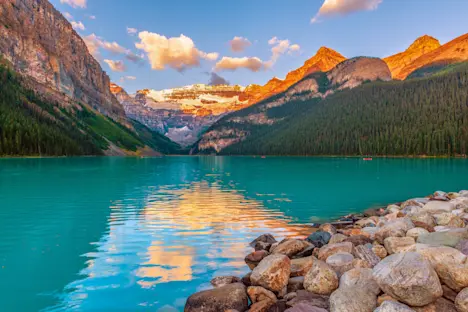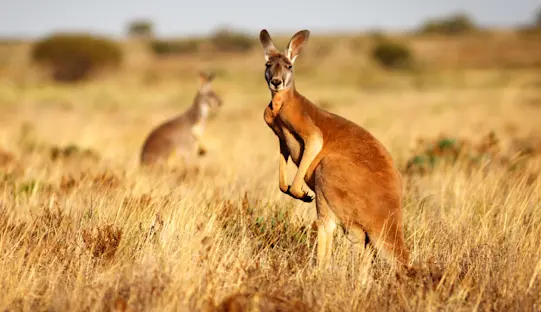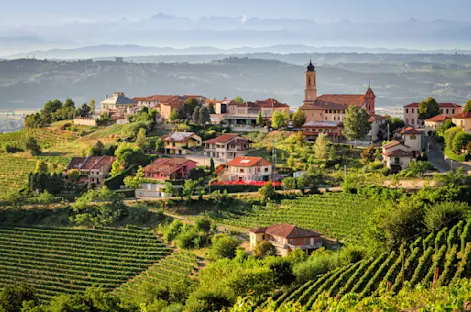
Know Before You Go: Alaska Adventures


How Do I Get Around Alaska?
Alaska’s sheer size and limited road network mean getting around often involves a mix of planes, boats, trains and guided ground transport. The state has few major highways, and many regions—especially national parks and remote coastal areas—are inaccessible by road. Reaching them often requires small aircraft, boats or train travel on the Alaska Railroad, which runs from Seward through Anchorage and Denali to Fairbanks. Within road-accessible areas like the Kenai Peninsula or Denali’s entrance, travelers use guided vans or minibuses operated by outfitters familiar with local conditions, regulations and wildlife safety.
Each mode of travel offers a different way to experience Alaska’s vast, wild terrain—from flightseeing over glaciers to cruising past tidewater ice and taking in mountain views from a domed railcar.
Ways to get around Alaska:
Alaska Railroad — scenic rail between Seward, Anchorage, Denali and Fairbanks
Bush planes — access remote lodges, national parks and wildlife areas
Boats or ferries — explore coastal fjords and marine parks
Guided vehicles — small-group vans or shuttles for road-based tours
Self-driving — limited to main highways like the Parks, Seward and Glenn Highways
What Is It Like to Fly in Alaska?
Flying is often the fastest—and sometimes the only—way to reach remote regions in Alaska. Small aircraft connect travelers to national parks, wildlife lodges and Native villages that are inaccessible by road. Bush planes are common in places like Katmai, Lake Clark and the Arctic, while chartered helicopters offer access to especially remote areas.
Many flights use small airstrips, gravel runways or floatplanes that land on lakes and rivers. These low-altitude routes reveal surreal aerial views of mountains, rivers and wildlife. Flights are often weather-dependent, but Alaska’s experienced bush pilots and flight crews are skilled in navigating rugged conditions.
Bush plane tips:
Most small aircraft have strict luggage weight limits—pack light
Flights often depart from Anchorage, Fairbanks or regional hubs like Homer
Expect unforgettable views of glaciers, tundra and wildlife from the air
"Often, to truly go off-grid, you need to travel to remote places; and that means getting there is half the fun. Accessible via a private bush plane—which leaves from Homer across Cook Inlet, providing views of glaciers and an active volcano before landing on a pristine beach—Natural Habitat Adventures’ Bear Camp in Lake Clark National Park, Alaska, offers rustic luxury…and the thrill of observing brown bears in their natural habitat—all without Wi-Fi or cell service." — Condé Nast Traveler
Where Can I Go By Boat in Alaska?
Boat travel is one of the most efficient ways to explore Alaska, especially along its 6,600-mile coastline and remote coastal communities. Whether you're cruising glacier-carved fjords or hopping between seaside towns, boats unlock access to landscapes and wildlife you can’t reach by road.
Alaska Marine Highway System: Public Ferry Access to Coastal Communities
The Alaska Marine Highway System is a public ferry network connecting Southeast and Southcentral Alaska. It’s a popular option for locals and independent travelers. Ferries carry passengers, vehicles and gear while offering panoramic views of fjords, whale sightings and rugged shorelines. Popular ferry routes link Juneau, Sitka, Ketchikan, Haines, Whittier and other port towns.
Small Ship Cruises: Intimate Access to Alaska’s Coastal Wilderness
For a more comfortable, curated experience, small-ship cruises—typically vessels with fewer than 100 passengers—offer intimate access to Alaska’s coastal wilderness. These expedition-style ships explore the Inside Passage, Prince William Sound and Kenai Fjords National Park, navigating narrow channels and anchoring in remote coves. Unlike big commercial cruises, these trips prioritize wildlife viewing, flexible itineraries and naturalist interpretation.
Day Boat Tours: Close Encounters with Alaska Wildlife
Day boat tours also operate from Seward and Homer, providing close-up encounters with whales, puffins and tidewater glaciers in just a few hours on the water. These trips are ideal for short stays or as part of land-based wildlife itineraries.
Expedition Vessel Adventures: Katmai National Park by Boat
Though most travelers reach Katmai National Park by floatplane, it can also be accessed by small expedition vessels. On Nat Hab’s exclusive grizzly bear adventures, guests stay aboard the M/V Natural Habitat Ursus, a privately chartered boat that offers rare access to the remote coastal wilderness of the Alaska Peninsula. Anchored near bear-rich meadows, the ship provides a quiet, mobile basecamp for observing brown bears fishing for salmon—often with no other travelers in sight.
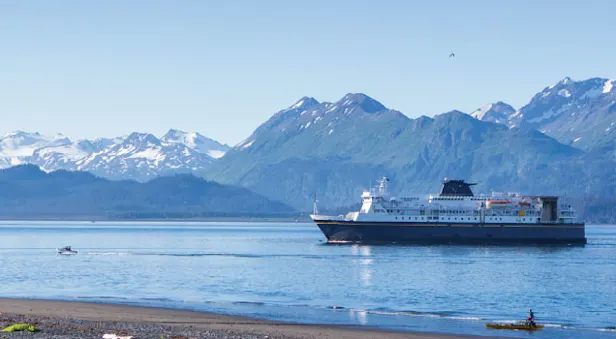
Ferries
Best for:
Independent travel, scenic budget option
Pros:
Flexible schedules, bring a car
Considerations:
Slower pace, fewer amenities
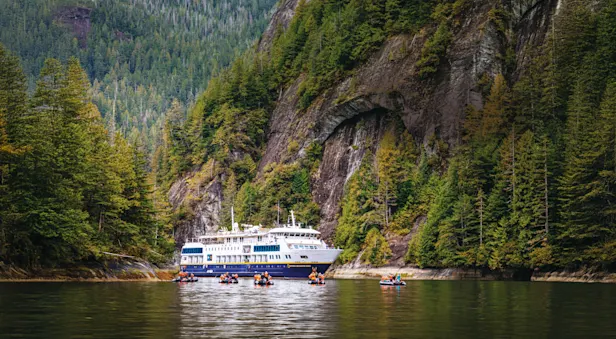
Small Ship Cruises
Best for:
All-inclusive glacier and wildlife tours
Pros:
Expert guides, gourmet meals, remote access
Considerations:
Higher cost, fixed itinerary
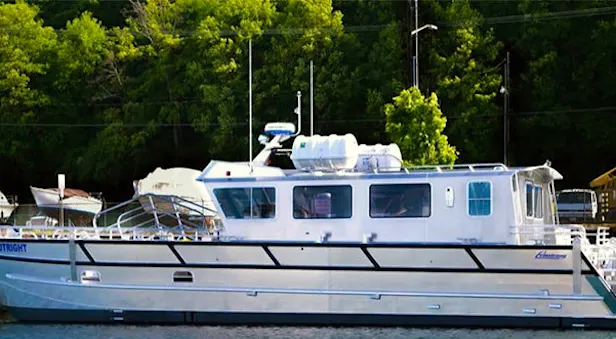
Day Boats
Best for:
Short excursions from towns like Seward
Pros:
Great for whale watching, puffins, glaciers
Considerations:
Weather dependent, shorter range
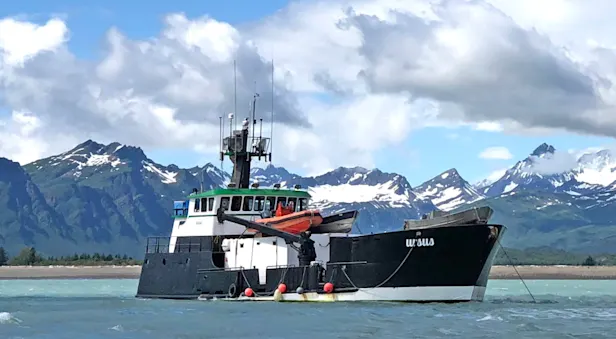
Expedition Vessels
Best for:
Remote bear viewing (e.g., Katmai)
Pros:
Exclusive access, floating lodge experience
Considerations:
Limited departures, highly specialized
"An expedition cruise through Katmai National Park proves one of the wildest rides in Alaska…For the adventurous looking for a wilder, unboxed Alaska experience, it’s the trip of a lifetime, like nothing I’ve ever experienced in my 34 years in this industry." —Virtuoso
Where Can I Travel by Train in Alaska?
The Alaska Railroad offers one of the most scenic and relaxing ways to explore the state. With routes connecting Seward, Anchorage, Denali and Fairbanks, the train winds past coastal fjords, alpine forests, braided rivers and wide-open tundra.
Passengers can choose between standard and domed cars with glass ceilings for panoramic views. Meals, commentary and wildlife spotting make the ride as memorable as the destination. Trains stop at key national park access points and pair well with self-drive or guided trips.
Highlights of the Alaska Railroad:
Coastal Classic Route (Anchorage to Seward): fjords, glaciers and Turnagain Arm
Anchorage to Denali: 8-hour journey through scenic backcountry
Travel at a relaxed pace while watching for moose and bald eagles
Can I Drive to See Wildlife and Nature in Alaska?
Yes—driving is an excellent way to explore Alaska’s road-accessible parks, scenic byways and wildlife-rich regions. Major highways connect Anchorage to Denali, Fairbanks, Homer and Seward, offering convenient access to iconic landscapes and small towns. Car rentals are available at Alaska’s major airports and in larger towns.
While much of Alaska is remote and roadless, several routes provide unforgettable scenery and access to nature. The Dalton Highway runs from Fairbanks to Prudhoe Bay, crossing the Arctic Circle and passing through vast tundra and boreal forest. The Seward Highway and Glenn Highway are National Scenic Byways that wind past glaciers, fjords and mountains. Summer is the ideal time to drive in Alaska, with long daylight hours and fewer weather-related delays. In remote areas, road conditions may shift from paved to gravel, and services can be limited—so plan ahead.
What’s the Best Way to Travel to Alaska's Remote Parks and Refuges?
Many of Alaska’s wildest places are off the road system. The best way to travel to these remote parks and refuges, like Lake Clark or Katmai, is to charter flights or go with a tour operator.
Are Guided Tours to Alaska's National Parks and Refuges Worth the Expense?
Guided tours are worth the expense when you’re traveling in Alaska, especially for remote or wildlife-focused trips. Guided tours remove the logistics guesswork and maximize your chances of seeing wildlife. Experienced naturalist guides handle transportation, lodging and safety in challenging terrain.
Many guided tours also include specialty access—like bear viewing platforms, private flights or overnight wilderness lodges. For first-time visitors or those exploring beyond the road system, a guided trip ensures a seamless and rewarding experience.
How Do I Choose the Best Nature and Wildlife Tour Operator in Alaska?
The best nature and wildlife tour operator in Alaska will offer expert naturalist guides, small groups, exclusive access to wild areas, and a strong commitment to conservation—qualities that define Natural Habitat Adventures. When choosing an operator, prioritize companies that focus on authentic wildlife encounters in remote settings. Look for small-group sizes, experienced local and expedition guides, and meaningful connections with Alaska’s land, wildlife and Indigenous cultures. A good tour company should handle complex logistics like bush flights and wilderness permits while offering comfort and safety in rugged terrain. It should also actively support conservation and responsible travel practices.
What sets Nat Hab apart:
Small groups for a more personalized, low-impact experience
Expert Expedition Leaders trained in wildlife biology and Arctic ecology
Private access to remote locations, like Nat Hab’s Alaska Bear Camp and the M/V Ursus
Seamless logistics including charter flights, fly-in lodges and guided transfers
Partnership with WWF, supporting science-based conservation in Alaska and beyond
With more than 35 years of experience in Alaska, Nat Hab offers unparalleled access to nature through thoughtfully designed itineraries and a deep respect for the wild.
M/V Natural Habitat Ursus
Frequently Asked Questions
Do I need a car in Alaska?
You need a car in Alaska if you're exploring road-accessible regions like Denali National Park or the Kenai Peninsula. But for remote wilderness adventures, a rental car isn’t necessary.
Alaska has only a few major highways, so driving is useful for visiting towns and parks connected by road. Many travelers rent a car to travel between Anchorage and Denali or to explore scenic areas like Seward, Homer, Turnagain Arm and Hatcher Pass.
However, Alaska’s most iconic wilderness areas—like Katmai, Lake Clark and Arctic refuges—can only be reached by plane, boat or train. In those places, guided tours typically include all necessary transfers.
Is it safe to take bush planes?
Yes, bush planes in Alaska are safe and essential for reaching remote wilderness areas. These small aircraft are designed for Alaska’s rugged terrain and unpredictable weather and they’re flown by experienced pilots with thousands of hours in Alaskan airspace.
Bush plane flights may be delayed due to weather, but safety is always the priority. These planes are a daily lifeline for locals, scientists, park rangers and travelers, providing access to Alaska’s wildest and most spectacular landscapes.
Many routes lead to roadless areas such as Katmai, Brooks Falls, Lake Clark and Arctic refuges. Passengers enjoy scenic aerial views of mountains, glaciers and wildlife along the way. Taking a bush plane isn’t just safe — it’s a memorable part of any Alaska adventure.
Can I combine a cruise with a wildlife lodge stay?
Yes, combining a small-ship cruise in Alaska with a wildlife lodge stay is one of the best ways to experience both the coast and the interior.
Many travelers pair a cruise through Alaska’s Inside Passage with a fly-in lodge stay for a deeper wilderness experience. This allows you to see tidewater glaciers, whales and marine life by sea, then enjoy bear viewing or backcountry hiking inland.
Popular combinations include small-ship cruises plus bear lodges in Lake Clark, day cruises from Seward or Homer with overnight Kenai backcountry stays, or wildlife cruises paired with a fly-in lodge at Brooks Falls or Chinitna Bay.
This approach gives travelers the best of both worlds: coastal exploration by water and remote wilderness experiences by air.
Alaska Tours
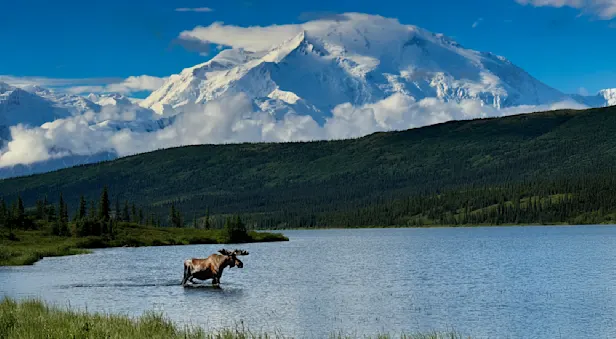
Ultimate Alaska Wildlife Safari
See more of wild Alaska on this wide-ranging, small-group adventure including Alaskan brown bears, a fly-in backcountry lodge in Denali National Park, marine life of Kenai Fjords, and the scenic Alaska Railroad to Seward.
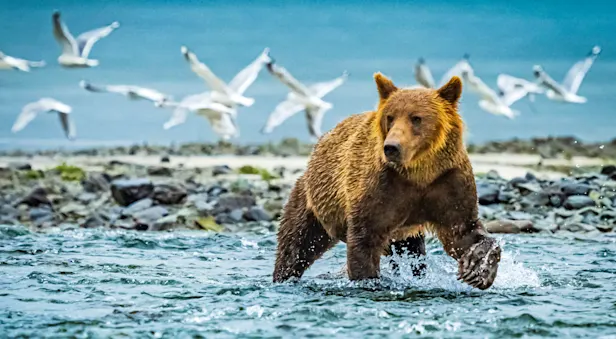
Nat Hab's Alaska Bear Camp
A secluded immersion with brown bears in the wilderness of Lake Clark National Park—enjoy total privacy and comfort at our deluxe fly-in wilderness camp accessed via chartered bush plane from Homer.
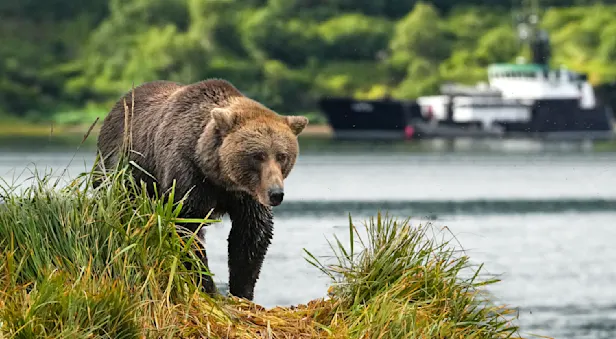
Alaska's Grizzly Ship: Kodiak to Katmai
An exclusive small-ship adventure to view giant brown bears—the world's largest "coastal grizzlies"—up close! Walk the shores as bears dig for clams, forage for sedges and pursue salmon in season in tidal streams.
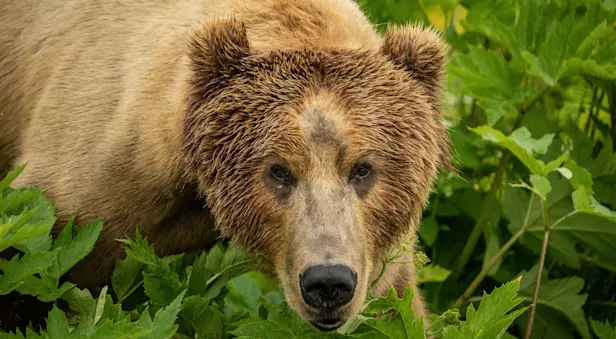
Ultimate Alaska Photo Expedition
A truly epic photography adventure! Alongside expert guides, get aerial shots of Denali from a helicopter; capture brown bear portraits at close range, and shoot glaciers, whales, puffins and more in Kenai Fjords.
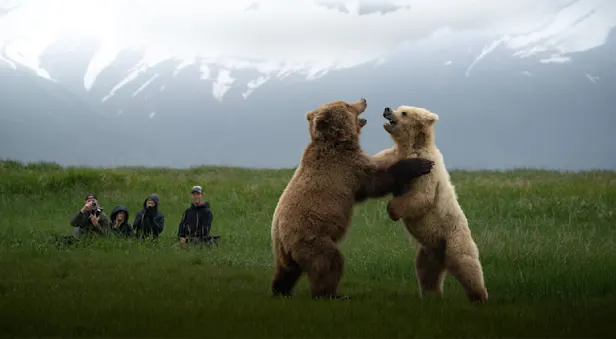
Grizzly Ship Photo Expedition: Kodiak to Katmai
Based aboard our private small ship, just eight guests photograph brown bears in the roadless Katmai wilderness, going ashore with an expert bear naturalist and photography pro who knows these animals intimately.
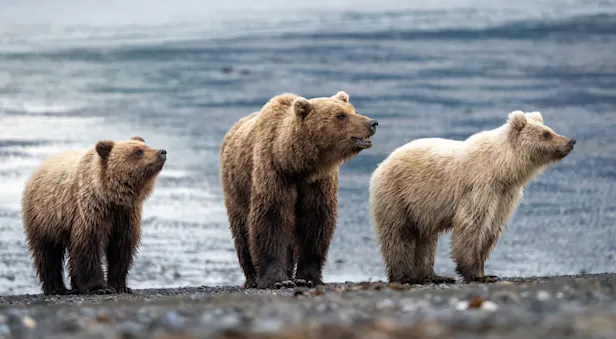
Alaska Bear Camp Photo Expedition
A secluded immersion with brown bears in the wilderness of Lake Clark National Park. Enjoy total privacy and comfort at our deluxe fly-in wilderness camp accessed via chartered bush plane from Homer.
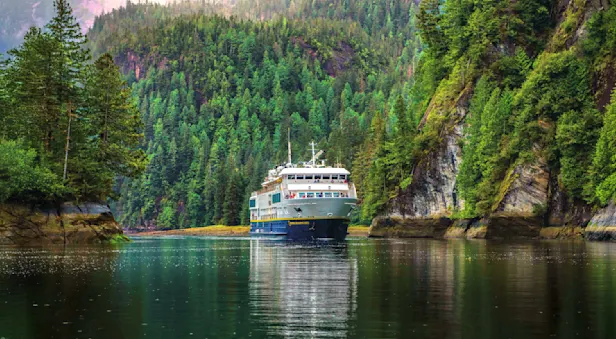
Alaska’s Inside Passage
A small-ship voyage through the narrow channels and fjords of Southeast Alaska's storied Inside Passage—meet wildlife up close in the company of top naturalists.






